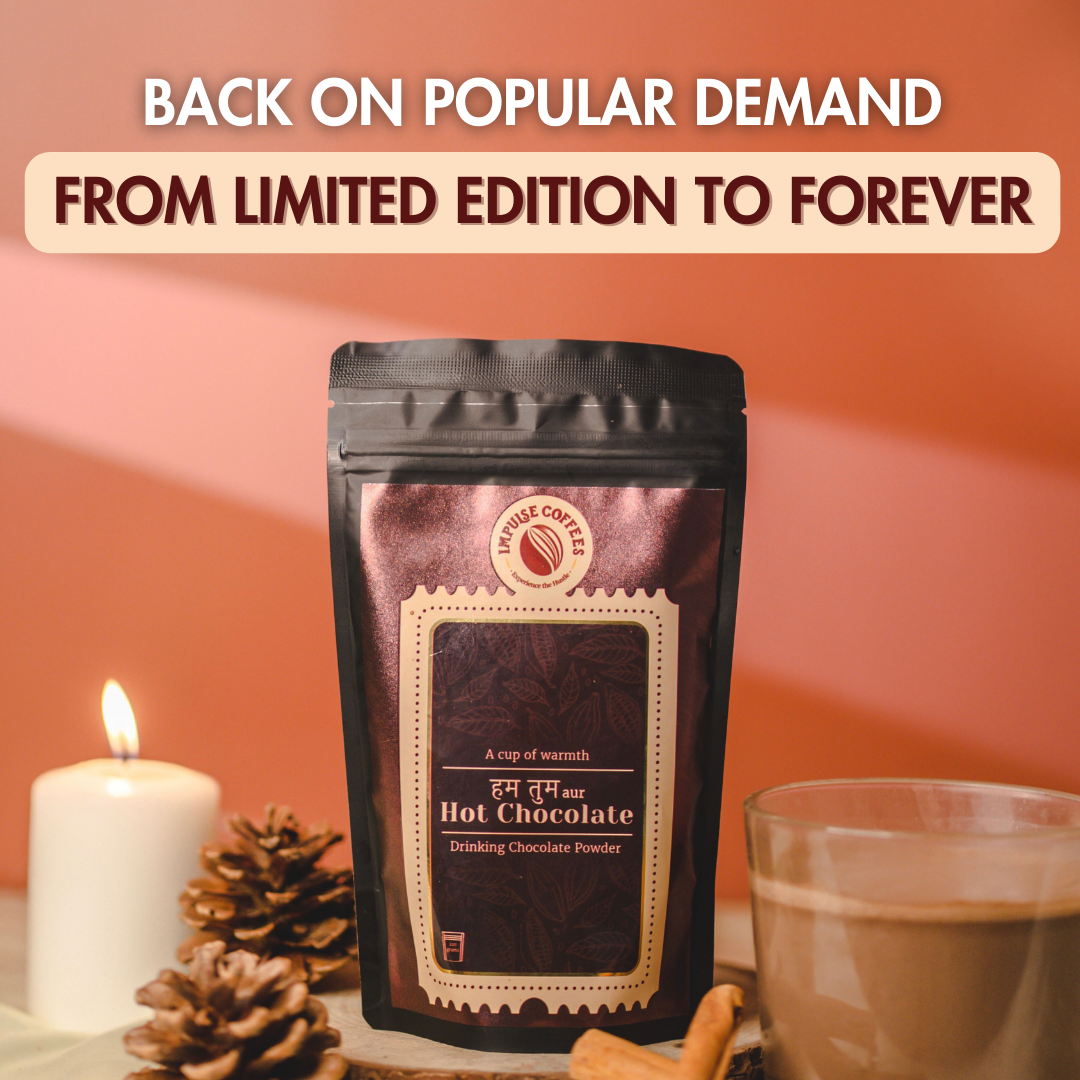What is Instant Coffee?
Unlike regular coffee, which needs brewing, Instant Coffee Powder can be directly used in Milk or Water to create the perfect cup of coffee. How? Instant Coffee Powder is regular coffee that has been dehydrated to remove as much water as possible, turning it into a fine powder. First, the coffee beans are roasted, ground into powder and brewed like your normal cup of coffee, then dehydrated into crystals by either freeze-drying or spray-drying. Instant Coffee also has less than half the caffeine content than normal coffee and is perfect for people who enjoy coffee flavors but are sensitive to caffeine.You can directly add spoonfuls of instant coffee to your hot water or milk of choice to prepare your coffee mug.
What is Filter Coffee?
If you have been to Bangalore, Chennai, or any South Indian city, you must have come across the beloved Filter Coffee, which is made in a vertical brass vessel. The coffee vessel or the tumbler, also known as Dabara, has a lower chamber and an upper chamber. The coffee powder goes into the upper chamber with boiling hot water on top of it. After the lid of the upper chamber is closed, the filter or the tumbler is set aside for 20-30 minutes until the coffee percolates to the lower chamber through a filter between the two chambers.This decoction is then combined with hot milk and sugar and served in a steel glass. The Filter coffee is an integral part of South Indian culture and symbolizes warmth and hospitality.
What are the Differences Between Instant and Filter Coffee
Instant coffee, known for its speed and convenience, is made by dehydrating brewed coffee into a soluble powder that quickly dissolves in hot water. In contrast, filter coffee, a more traditional and immersive experience, involves brewing freshly ground coffee beans with hot water through a filter, yielding a richer and more aromatic cup. While instant coffee offers a quick caffeine fix, filter coffee is cherished for its depth of flavor and the ritualistic pleasure of brewing. Each has its own charm and caters to different tastes and lifestyles. Let’s understand more differences between Instant and Filter Coffee
Health Differences Between Instant and Filter Coffee
Caffeine Levels:
- Filter Coffee: Typically has higher caffeine content per cup because it uses a greater amount of coffee grounds and a longer brewing time.
- Instant Coffee: Usually has less caffeine per serving, which can be beneficial for those looking to reduce their caffeine intake.
Cholesterol Impact:
- Filter Coffee: Filters out most of the coffee oils (cafestol and kahweol) that can raise cholesterol levels.
- Instant Coffee: Contains fewer oils due to the extraction process, making it less likely to impact cholesterol levels.
Additives and Preservatives:
- Filter Coffee: Typically free of additives, providing a purer coffee experience.
- Instant Coffee: Some brands may include added preservatives, stabilizers, or flavor enhancers, which can affect overall health. Impulse Coffees’ Instant Coffee powders are USDA Certified and are free of additives, preservatives, and stabilizers. The coffee powders have no chicory unlike other instant coffee brands and only use pure Arabica and Robusta beans harvested from Chikmagaluru, Karnataka.
Glycemic Index:
- Filter Coffee: Generally has a negligible impact on blood sugar levels, making it a suitable option for those monitoring their glucose.
- Instant Coffee: Also has a low glycemic index, but pre-mixed or flavored varieties may contain added sugars. Impulse Coffees prides itself on having no added sugar in the Instant Coffee powders.
Preparation Time and Nutrient Loss:
- Filter Coffee: Takes longer to prepare, which can preserve more of the coffee's natural nutrients.
- Instant Coffee: Quick to prepare, and can be had on the go.
Flavour Differences Between Instant and Filter Coffee
The flavor profile of coffee is influenced by the type of beans, the brewing method, and the preparation process. Here's a comparison of the flavor differences between instant coffee and filter coffee:
-
Flavor Profile:
- Instant Coffee: Instant coffee tends to have a more straightforward and less complex flavor. The flavor is often described as mild and somewhat flat, with less pronounced aromatic and flavor notes. It may have a slight bitterness and a hint of a metallic aftertaste. Impulse Coffees is changing the Instant Coffee game by combining exciting flavors such as Pineapple, Raspberry, and Chocolate with Coffee with an aroma that fills the room.
- Filter Coffee: Filter coffee, brewed from freshly ground beans, offers a richer, more complex flavor with a wide range of taste notes, including fruity, floral, nutty, or chocolatey, depending on the coffee beans used. The slow brewing process helps extract subtle flavors and aromas, giving a fuller and more layered taste experience.
-
Consistency:
- Instant Coffee: Instant coffee provides a consistent flavor experience. Each cup will taste virtually the same, as the coffee is pre-brewed and standardized. The flavor is reliably the same across batches and brands, making it a dependable choice for those who prefer consistency.
- Filter Coffee: The flavor can vary significantly based on the type of beans, roast level, grind size, and brewing method. You can adjust the strength and flavor by varying the coffee-to-water ratio, grind size, and brewing time.
-
Flavor Additives:
- Instant Coffee: Instant coffee may come with added flavors like vanilla, caramel, or hazelnut, which can enhance the taste.
- Filter Coffee: Filter coffee includes natural coffee oils and soluble solids that contribute to a fuller body and richer mouthfeel, creating a creamier texture. These oils also help retain the coffee's natural flavor complexity and depth.
Aroma Differences Between Instant and Filter Coffee
- Instant Coffee: The aroma is much milder in Instant coffee since the manufacturing process of freeze drying or spray-drying leads to a simpler scent profile. However, It provides a consistent aroma across different batches and brands due to standardized production processes
- Filter Coffee: Boasts a more complex aroma. The brewing process allows for a full release of these fragrances, creating a more engaging and aromatic experience. Filter Coffee delivers a variable aroma that can change with different types of beans, roast levels, and brewing methods.
Price Differences Between Instant and Filter Coffee
The price difference between instant coffee and filter coffee largely hinges on factors such as quality, convenience, and the complexity of the brewing process. Instant coffee generally costs less per serving due to its simplified production and packaging, making it a budget-friendly option for quick caffeine fixes. Filter coffee, on the other hand, can be more expensive since it needs equipment which may be expensive.
What are the Advantages of Instant Coffee When Compared to Filter Coffee?
Convenience and Speed:
- Quick Preparation: Instant coffee can be made in a matter of seconds by simply adding hot water. There's no need for grinding beans, brewing, or waiting, making it ideal for busy mornings or when you're in a rush.
- No Equipment Needed: You don’t need any specialized coffee-making equipment, such as grinders or coffee machines, making it perfect for travel, camping, or situations where minimal setup is desirable.
Cost-Effectiveness:
- Lower Cost per Serving: Generally, instant coffee is cheaper per serving compared to filter coffee. This is due to its mass production and the fact that it doesn’t require any additional brewing accessories or equipment.
- Minimal Waste: Instant coffee eliminates the need for coffee grounds or filters, reducing waste and making cleanup easier. It’s a cost-effective solution for everyday use.
Long Shelf Life:
- Extended Freshness: Instant coffee has a much longer shelf life than ground coffee beans or freshly brewed coffee. It can be stored for months without significant loss of flavor or quality, making it a practical option for those who do not consume coffee daily.
- Stable Flavor: The flavor of instant coffee remains consistent over time, unlike ground coffee, which can lose its freshness and develop off-flavors relatively quickly.
Portability:
- Easy to Transport: Instant coffee is lightweight and portable, often available in single-serving packets. This makes it convenient for travel, office use, or outdoor activities where carrying bulky coffee-making equipment is impractical.
- Ready Anytime: You can enjoy a cup of instant coffee anywhere you have access to hot water, making it a versatile choice for on-the-go caffeine needs.
Consistency:
- Uniform Flavor: Instant coffee provides a consistent taste with every cup, as the product is standardized during manufacturing. This uniformity ensures that you get the same flavor experience every time, without the variability that can come from different brewing methods or bean freshness.
Low Maintenance:
- Easy Cleanup: There are no coffee grounds or filters to deal with, and minimal cleaning is required. This makes instant coffee particularly appealing for those who prefer a hassle-free coffee-making process.
- No Equipment Maintenance: Since no specialized brewing equipment is needed, there’s no maintenance required, saving both time and effort.
Variety and Availability:
- Wide Range of Options: Instant coffee is available in a variety of flavors and formats, including decaffeinated, flavored, and specialty blends. This variety caters to different taste preferences and dietary needs.
- Easily Accessible: Instant coffee can be found in virtually any grocery store and often comes in convenient packaging sizes, making it accessible to a wide range of consumers.
Instant coffee and filter coffee each have their distinct advantages catering to different preferences and lifestyles. Instant coffee offers convenience with quick preparation, affordability, and a longer shelf life, making it suitable for busy individuals or those seeking a straightforward coffee option. On the other hand, filter coffee provides a richer, more nuanced flavor profile due to the use of freshly ground beans and customizable brewing methods, appealing to those who appreciate the sensory experience and quality of brewed coffee. The choice depends on personal taste preferences and the desired coffee-drinking experience.







Leave a comment
All comments are moderated before being published.
This site is protected by hCaptcha and the hCaptcha Privacy Policy and Terms of Service apply.